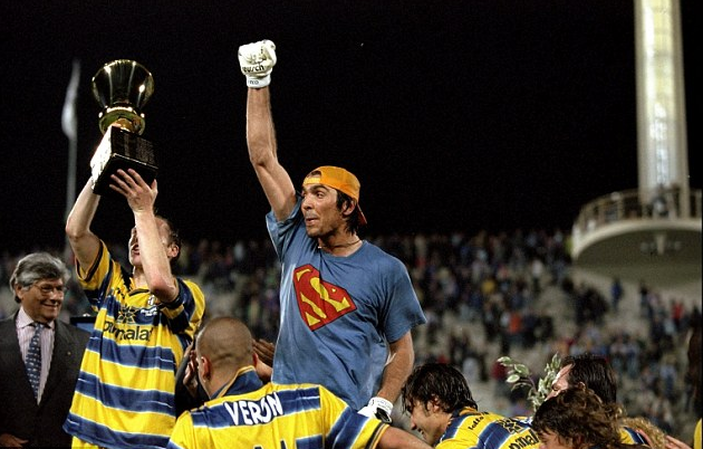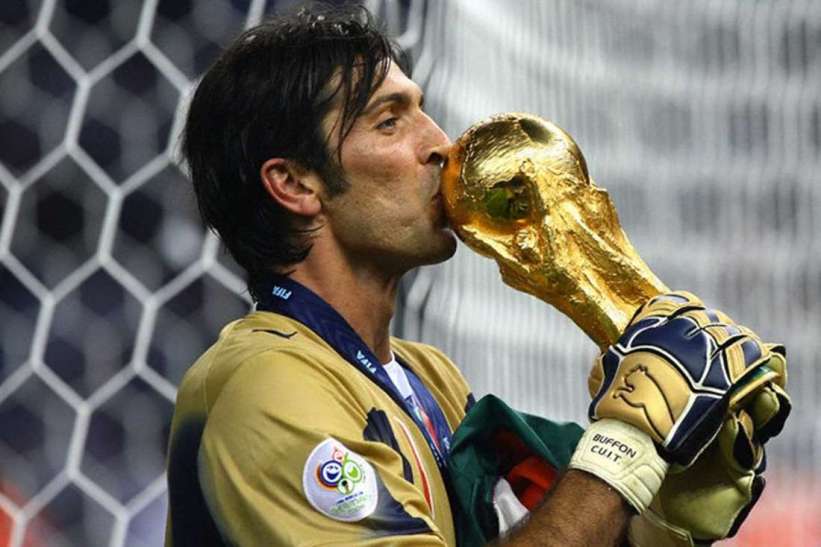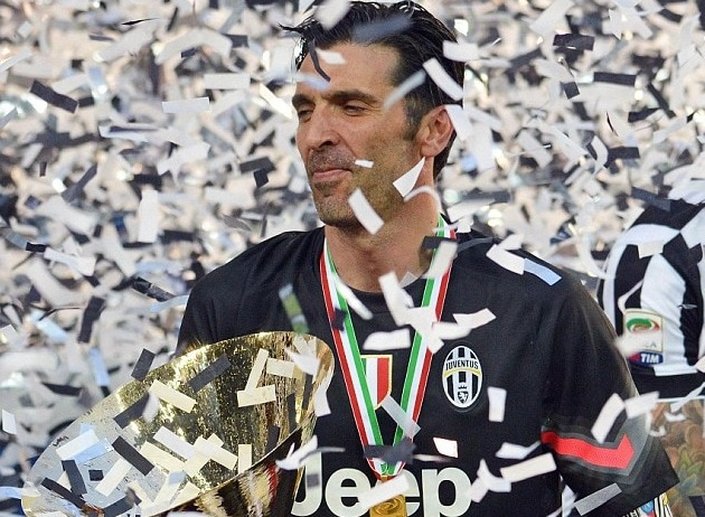The day was November 19, 1995. Needing a shakeup between the posts for his side’s upcoming clash against the then Serie A reigning champions AC Milan, Parma boss Nevio Scala called upon a certain 17-year-old phenomenon from the youth academy. His name was Gianluigi Buffon.
With the crème de la crème of Italian football rolling into town, there was no room for mistakes. The game finished 0-0, with Buffon making a number of top-drawer saves against the likes of Roberto Baggio and George Weah. What calcio fans didn’t know, was that they had just witnessed the debut of arguably the greatest goalkeeper of all time. Twenty two years later and that same 17-year-old has amassed over 1000 appearances and still plays an integral role for both Juventus and Italy.
But things could have been so different were it not for Cameroon’s goalkeeper, Thomas N’Kono. Before N’Kono’s heroics at Italia 90’, Buffon did not envisage a future between the posts. In fact, the legendary Azzurri custodian initially played in midfield for Parma’s youth academy. Nevertheless, injuries to both Parma’s youth keepers meant there was a gap to fill. Fresh off seeing N’Kono’s brilliance unfold on the world stage, Buffon was interested in the vacant post. After being given the role, it wouldn’t be long before he got used to life inside the 18-yard box. Under Ermes Fulgoni’s tutelage – the academy’s goalkeeping coach at the time – Buffon went from strength to strength and quickly forgot about his past in the midfield. To this day, he still maintains that N’Kono was a major reason behind his switch from midfield to goalkeeper.
In Darwin Pastorin’s, I Portieri del Sogno, Buffon explains in detail what being a goalkeeper means to him:
A goalkeeper is not something you become, but instead it is fate. You are born a goalkeeper. Being a goalkeeper does not come from reasoned thought, it’s quite simply your vocation in life. You are a goalkeeper in your everyday life. You are a goalkeeper in school. One of a kind among your friends. A goalkeeper is someone who courageous. Goalkeepers are fearless, charismatic people and even a bit immature.
In Buffon’s case, at least, it seems that fate was indeed what brought him between the posts. However, it was hard work that kept him there. After being named Parma’s starter for the 1996-1997 season, he quickly established himself as one of the best young talents on the peninsula. The Gialloblu would go on to finish the season as runners-up to Juventus, while Buffon conceded a mere 17 goals in 27 appearances.
Having impressed with Parma, Cesare Maldini handed Buffon his international debut in a World Cup qualifying game against Russia, after Gianluca Pagliuca went down injured. As was the case during his Parma debut, this precocious talent seemed unfazed by the international stage and made a number of crucial saves, helping Italy secure their path to the 1998 World Cup. It was then that Italy fans realised they had a predestinato on their hands. By the 2002 World Cup, the young keeper had become Italy’s undisputed Number One.
At domestic level, Buffon had to wait until his fourth senior season to taste success, as Parma won the Coppa Italia and the UEFA Cup in 1999. His calm and assured performances throughout the two cup runs put the rest of the world on notice, and Juventus, Barcelona and Roma soon came calling. In the summer of 2001, Buffon signed with Juventus for a world-record goalkeeper’s transfer fee of 100 billion lire (£32.6 million), rejecting Spanish temptation.
 Buffon celebrating Parma’s Coppa Italia victory
Buffon celebrating Parma’s Coppa Italia victory
The Italian stopper didn’t let the pressure of his price-tag get to him and continued to perform admirably. At Juventus, he went from potential superstar to world-class goalkeeper within the blink of an eye. In his first four seasons with the club, the shot-stopper won four Scudetti and two Italian Super Cups. Had it not been for David Trezeguet, Marcelo Zalayeta and Paolo Montero’s missed penalty kicks in the 2003 Champions League final, Buffon would have also conquered Europe’s elite competition. But, after an incredible start to his Bianconeri career, controversy struck.
Due to Juve’s involvement in Italy’s well-documented match-fixing scandal, Calciopoli, la Vecchia Signora were stripped of two league titles and were sent down to Serie B with a point deduction. While concerns over Buffon’s future lingered ominously for Juventini, there was still a World Cup to be played that year. Instead of letting the negative energy surrounding Italian football affect him, Buffon used it to spur him and his teammates onto World Cup glory in Germany. Throughout Italy’s campaign, their irrepressible portiere cemented his legendary status in the hearts of all calcio fans with masterful performances, most notably on that famous semi-final night against Germany. He would also finish second that year in the race for the 2006 Ballon D’or, only behind his teammate Fabio Cannavaro.
When he returned from the World Cup, it was back to reality for Gigi. The conundrum was simple but no less painful: stay with Juventus in Serie B in the prime of his career, or move on to greener pastures and abandon ship? Despite having many offers on the table, Buffon stayed aboard and led the club’s revival alongside a few other club legends, including Alex Del Piero, Pavel Nedved and David Trezeguet. After winning promotion back to Italy’s top flight at the first time of asking, Buffon and Juventus’ road to redemption continued. In their return season, the Turin-based giants finished a respectable third place, but doubts were being raised over Buffon’s continuity as he began suffering from back problems. Many even went as far to claim that it was almost the end of the road.
Even if I were offered twice my salary elsewhere, I would stay at Juve.
In the seasons that followed, it only got worse for Buffon and Juve. As the veteran custodian kept suffering setback after setback, Juventus were struggling on the field. Their round of 16 Europa League exit to Fulham in the 2009-10 season epitomised everything that was then wrong with the club. Long gone were the days of a dominant Juventus. Instead, the Bianconeri were painfully mediocre.With Juventus coming off the back of consecutive seventh place finishes, a change was needed at the club. Luigi Delneri was soon fired and in came the fiery Antonio Conte. Before the Italian tactician arrived, rumours surfaced that Storari would be Conte’s Number One. However, that speculation was quickly dispelled by the Italian coach. Upon his arrival, Conte gave Juve’s veteran players more prominent leadership roles and Buffon became the club’s captain marvel.
Under the former Siena boss, it wasn’t long before Juve re-found their grinta and began playing with confidence again, and with each passing week, this was embodied by the performances of Buffon. Juventus went undefeated in Conte’s first season, beating Max Allegri’s AC Milan to the Scudetto. This heralded the beginning of a new winning cycle. Juve had completed their return to the top of Italian football. Buffon, a man some had decided to write off just a few years previous, was integral and an ever-present leader in the three consecutive titles that followed.
 Click to read: ‘Celebrating the Italian Art of Goalkeeping: From Zenga to Buffon’
Click to read: ‘Celebrating the Italian Art of Goalkeeping: From Zenga to Buffon’
Conte’s departure before the 2014-2015 season didn’t change much for Buffon and company. In fact, you could argue it made Juventus hungrier to prove a point to their departed manager. Determined to demonstrate their worth under new stewardship, la Vecchia Signora improved under Allegri. After comfortably securing their fourth consecutive Scudetto, Juventus set their sights on returning to the European summit.Wins against Borussia Dortmund and Monaco in the Champions League round of 16 and quarterfinals respectively, set up an enticing semi-final against Real Madrid. It was now time for Juventus and Buffon to prove they once again belonged among Europe’s elite. After narrowly prevailing at home against Los Blancos, Juventus travelled to the Bernabeu with a point to prove. In Spain, Buffon was characteristically inspirational, shutting down the likes of Ronaldo, Bale and Benzema at crucial points in the game, allowing Alvaro Morata to equalize for Juve in the 57th minute and send the Italians through 3-2 on aggregate. This set up a date with destiny in Berlin, against another Spanish giant, Barcelona.
Nine years after lifting the World Cup in the Olympiastadion, Buffon returned to the stadium in which he became a legend. The doubters had been proved emphatically wrong and while Juventus ended the game on the wrong side of the result, they and their magisterial captain had earned back the respect of Europe’s footballing aristocracy.
Today, Juventus are well on their way to their sixth consecutive league title, while Italy are entering a new era under coach Giampiero Ventura. Despite the ever-changing nature of the modern game, one thing has remained constant over the years: Gigi Buffon. Just last month, the Juve and Azzurri stalwart made his 1000th career appearance in a World Cup qualifier against Albania, concomitantly making him the most-capped player in Italy history with 168 appearances.
His secret? He approaches every game like it’s his last. That same passion was evident 22 years ago, when he made his debut as a baby-faced teenager, and it still burns inside him today. At 39 years old, you can still find Buffon belting out the Italian national anthem at the top of his lungs, and he remains Juventus’ leader, both on and off the pitch.
When Buffon finally decides to retire, he will go down as one of the game’s greats and as arguably the best to ever play the position. In a recent interview with goal.com, Buffon unwittingly summed up his career in one sentence. “If I do something, I do it with the idea to get to the top – without that, I would stop living.”
And get to the top, he did.

